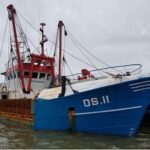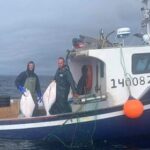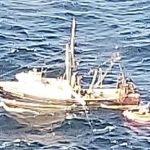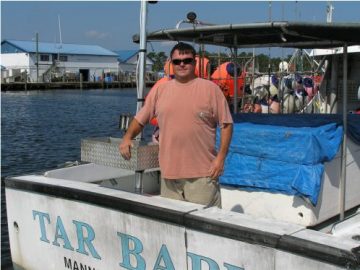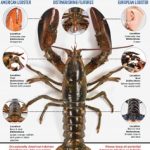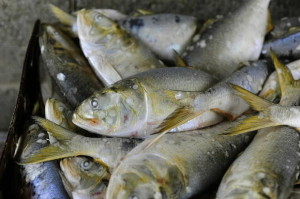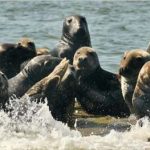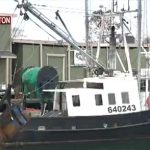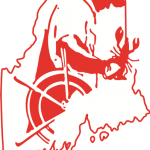Monthly Archives: September 2020
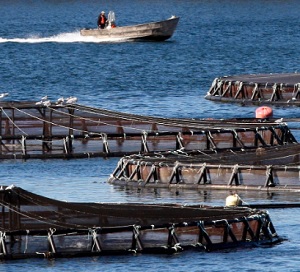
Opposition grows to expanding fin fish farming
The Trump administration and the aquaculture industry said the order, which is being implemented now, represents common sense steps to ease the burden of rules on fish farmers. “They’re trying to somehow connect open-water aquaculture with the need for domestic food. But it just doesn’t make sense,” said Marianne Cufone, executive director of the Recirculating Farms Coalition,,, Some fishing groups have also come out in support of the order. Scot Mackey, director of government affairs for the Garden State Seafood Association, which advocates for fishermen as well as farmers, said the order “will help the industry weather the current crisis and come back stronger.” Neville Crabbe, spokesman for the Atlantic Salmon Federation, a conservation group, said the federal permitting process should be creating land-based aquaculture rather than fish farms in the ocean, let alone offshore. >click to read< 18:13
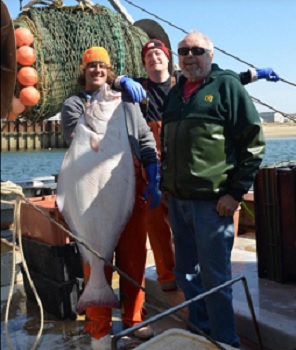
‘Amazing’ halibut, one of the largest fish in the Gulf of Maine, are making a comeback
Halibut are one of the largest fish in the Gulf of Maine, second only to bluefin tuna, swordfish and large sharks. Historically they were a mainstay of the fishing industry along with cod. The National Marine Fishery Service began regulating the halibut fishery in the 1990s and there is a one fish per trip per boat limit on catch. This has been a boon to their rebound. This past spring while fishing for haddock my husband, David, caught four huge halibut. They ranged in size from 40 to 60 pounds. In the past, he has caught one or two a year which were large enough to be legal to keep. The current minimum size is 41 inches. My husband caught two halibut near Jeffrey’s ledge in the mid-1990s which weighed 120 to 140 pounds.,, but David has noticed a strange thing about halibut, they seem to swim in pairs. >click to read< 15:29
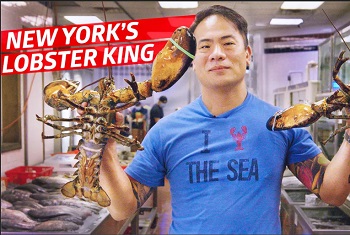
This Seafood ‘Sourcerer’ Runs New York City’s Lobster Game
“A lobster’s not just a lobster. A lobster is just like a diamond,” says Wong of the many different types of lobsters he sources from all over the country. Before COVID-19, the shop went through an average 60 to 80 thousand pounds of lobster per week, and during the holidays that number could be up to 150 thousand pounds. Wong’s company sells lobster and other fish to 175 restaurants in the northeast, and they ship anywhere in the world in under 24 hours; “even in Singapore,” he notes, “which has the longest flight, like 19 hours.” Eater followed Wong throughout his typical day. His first task, which begins around around 6:00 a.m., is to fulfill special fish orders for specific restaurants. At 9:00 a.m. he receives an order of fish from Fulton Fish Market,,, >click to read< 13:41
Athearn Marine Agency Boat of the Week: 40′ Novi Clammer/Quahogger, John Deere Diesel
To review specifications, information and 18 photos, >click here< To see all the boats in this series, >click here<11:08
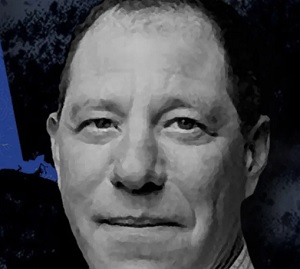
Sexist much? Al Gross says it takes ‘cajones’ to do a job
In Al Gross’ latest radio ad, he says that in spite of what he has said on the record, he’s not really a liberal, but an Alaskan. He is walking back his previous statements, in which he clearly said he will join the Democrats, which would put Sen. Chuck Schumer in charge of the Senate. But then he gets confused about what it takes to be an effective senator. Gross says he’s a man who has “the cajones” to do the job of U.S. Senator. It’s an odd statement for someone as liberal as Gross, who stands with Planned Parenthood in favor of late-term abortion. Especially ballsy as a Juneau boy taking on a U.S. Marine who has served in Afghanistan. >click to read< 09:08
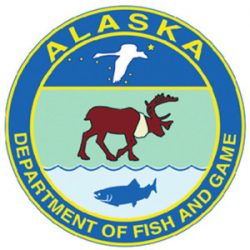
Coronavirus: Observer plans modified for commercial crab season
Observer deployment plans for the upcoming commercial crab season have been modified by the Alaska Department of Fish and Game in order to reduce risks of exposure to the COVID-19 virus, while still meeting minimum stock assessment data needs. ADF&G officials said that to accommodate revised deployment strategies, all vessels initially placed on the alternate selection list should be advised that they have a higher likelihood of being selected to carry an observer. Additional details on final observer deployment plans are to be provided by ADF&G,,, >click to read< 07:39
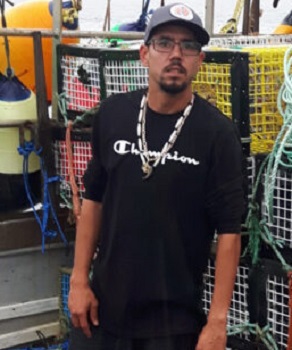
Nova Scotia Mi’kmaw lobster harvester to file an injunction against DFO for seizing traps
“I’m going to get (my lawyer) to file an injunction on my behalf preventing the DFO from violating my rights until they get this moderate livelihood stuff settled,” Matthew Cope, 34, said. Cope, who is from the Millbrook First Nation, said he left the wharf in Digby, N.S. on Aug. 29 to check on his lobster traps when he saw DFO officers aboard the Canadian Coast Guard Vessel, The Earl Grey, seizing 60 of his traps. “We had ten trawls of fifteen each. They took six of them. We caught them in the middle of taking our trawls so I stood up beside them and I said, ‘What are you guys doing?’” Cope explained. “I have a pre-existing inherited treaty right for fishing and I have a right to do so unhindered,” he said. >click to read< 21:46
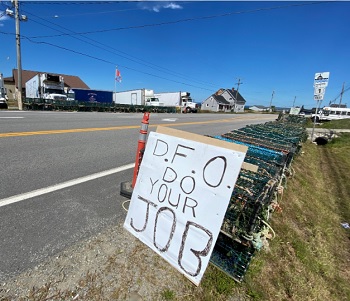
Quiet seafood truck protest: DFO urged to crack down on illegal out of season lobster fishing
The owner of a seafood company that has trucks parked at the DFO detachment declined an interview and wouldn’t comment about the protest or who organized it. Asked why the trucks are there the company owner simply said, “DFO knows.” The trucks were first parked at the DFO detachment on Aug. 27, the same day hundreds of commercial lobster fishermen protested outside of federal Fisheries Minister Bernadette Jordan’s office in Bridgewater demanding DFO provide enforcement. As they have in previous summers, fishermen have been raising concerns over what they say is out-of-season commercial lobster harvesting taking place. They say commercial activity is happening under the guise of the First Nations fishery and accuse some fishers of abusing the intent of that fishery. photos, >click to read< 20:38
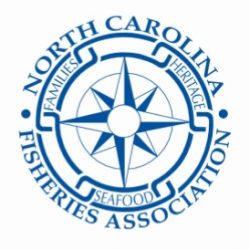
North Carolina Fisheries Association is working on relief efforts for victims of Hurricane Laura in the Gulf
Doug Cross of Pamlico Packing and Meade Amory are working on accumulating seafood and other items that will be trucked to Amory Seafood in Virginia and Evans Seafood in Washington NC. Thanks to NCFA Board member Ross Butler, a semi from True North Seafood will pick up the items and transport it to Louisiana. >click to read< 17:49
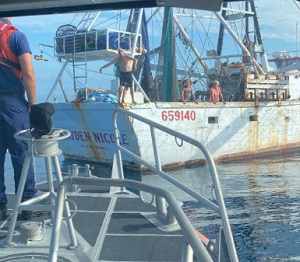
Coast Guard assists sinking fishing boat off Key West
Coast Guard rescue crews assisted a 73-foot commercial fishing boat after it started taking on water about 46 miles northwest of Key West. The F/V Kayden Nicole’s emergency positioning indicating radio beacon alerted Coast Guard watchstanders that the three person crew was in distress. Station Key West’s 45-foot Response Boat crew arrived on scene and transferred a F/V Kayden Nicole to the fishing crew. >click to read< 13:53
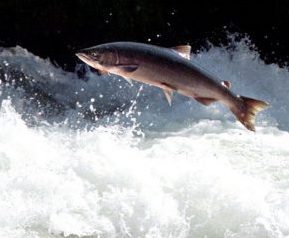
Fraser River sockeye fishery could be shut down for years
Fraser River sockeye, once the bread-and-butter of the commercial sector, appear to be collapsing for real this time. In 2009, low returns were described as a collapse, but the next year, Fraser River sockeye staged a major comeback, with 28 million fish returning, followed by 19 million in 2014. The Pacific Salmon Commission (PSC) estimates that only 283,000 sockeye may return to the Fraser River this year – a fraction of the 941,000 in a pre-season forecast, and only one-quarter of what is needed to meet this year’s escapement target. >click to read< 10:18
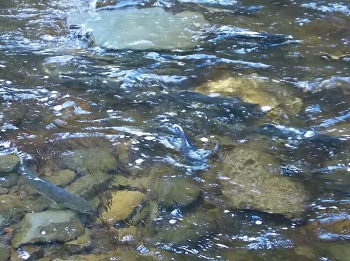
Southeast Alaska pink salmon catch could be lowest in 44 years
Two years ago the commercial catch of pink salmon in Southeast Alaska hit its lowest level in more than four decades. This year’s catch will be even lower. Andy Piston is the department’s pink and chum salmon project leader for Southeast. He said the catch by late August had topped six million fish and is expected to finish around seven million pinks by the end of the season. “It looks like it’s going to come in a little below the 2018 parent year harvest which was about 8.1 million and that’ll be, it’ll be one of the lowest harvests since the mid-1970s. >click to read< 09:36

The Coast Guard has launched ‘Operation Bubba Gump’. No, seriously!
Besides an awesome name and a tribute to one of the finest fictional soldiers to ever serve, Operation Bubba Gump is a joint state and federal effort to protect and enforce fishing regulations in the waters off of South Carolina and Georgia that the service kicked off last week. Nine different Coast Guard units partnered with South Carolina and Georgia’s Departments of Natural Resources, the South Carolina Law Enforcement Division and the NOAA Office of Law Enforcement to patrol both state and federal waterways, according to a Coast Guard release. >click to read< 08:49
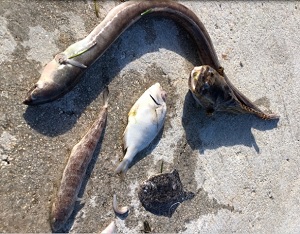
Nutrient Pollution and Algae Blooms: Pollution Has Cost Florida Millions, and the Bill Keeps Rising
Amid a historic fish kill in Biscayne Bay, the public’s eyes are on some of the causes of the dire situation plaguing our waters: nutrient pollution and algal blooms. Nitrogen and phosphorous from fertilizers and sewage-treatment plans across the state are supercharging the growth of toxic algae that makes the water undrinkable and depletes it of oxygen. Cleaning up that algae hasn’t been cheap. Over the past decade, the State of Florida has spent at least $20 million cleaning up and preventing algal blooms in its major bodies of water, according to a recent study by the nonprofit Environmental Working Group (EWG). >click to read< 08:00
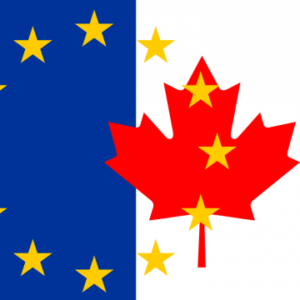
Trade minister says she’ll keep eye on U.S. probe of Canadian lobster industry
The Canadian industry gained most of the Chinese market that the Americans lost after China slapped a 35 per cent tariff on U.S. lobster exports. Canada also saw its lobster exports grow in Europe after it signed the Comprehensive Economic and Trade Agreement, or CETA, with the European Union, giving it a tariff advantage over its U.S. competitors. The Trump administration, however, has recently signed an agreement with China that removes the 35 per cent tariff. And a separate deal with Europe also removed tariffs on American lobsters that had provided the Canadian industry an advantage. Executive Director Geoff Irvine (Lobster Council of Canada) said Monday the lobster industries of Canada and the United States are now back on an even playing field. >click to read< 07:17


































